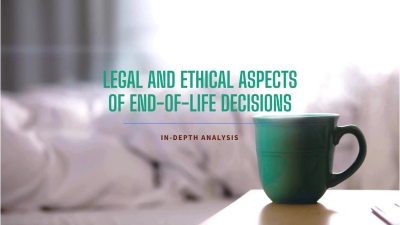Context
In the journey of life, death stands as an undeniable certainty, a destination all must eventually reach. Yet, the manner in which individuals approach this inevitability varies profoundly across cultures and societies. The contrasting accounts of Ronald Reagan's tranquil passing amidst loved ones and Atal Bihari Vajpayee's prolonged confinement to life support machines highlight the divergent landscapes of end-of-life care. These narratives underscore the ethical complexities and legal ambiguities surrounding the pursuit of a dignified departure, particularly in the context of Western practices of advance directives juxtaposed with India's struggle for clarity and compassion in end-of-life decisions.
Divergent Narratives: Ronald Reagan and Atal Bihari Vajpayee
The stories of Ronald Reagan and Atal Bihari Vajpayee offer poignant reflections on the spectrum of end-of-life experiences. Ronald Reagan's serene transition, enveloped by the embrace of family despite his battle with dementia, illustrates the importance of dignity and familial presence in the final moments. Conversely, Vajpayee's prolonged dependence on life support machines underscores the challenges and ethical dilemmas inherent in modern intensive care settings, particularly in the absence of clear directives and compassionate frameworks.
While Western societies increasingly embrace the concept of advance directives, allowing individuals to express their end-of-life preferences, India grapples with a landscape marked by the routine medicalization of death within intensive care units. This disparity not only reflects cultural differences but also underscores the ethical imperative of honoring individual autonomy and dignity in the face of mortality.
Ethical Imperatives and Legal Challenges
The ethical imperative to alleviate suffering and provide comfort in the face of incurable illness serves as the cornerstone of medical care, as articulated by the Indian Council of Medical Research. However, the translation of these principles into practice remains fraught with challenges, exacerbated by legal ambiguities and cultural norms. The normalization of intensive care deaths and the lack of comprehensive legal frameworks governing end-of-life care contribute to a landscape rife with ethical dilemmas and moral uncertainty.
The 2023 Supreme Court verdict acknowledging the validity of advance directives and the withdrawal of life support in futile circumstances represents a significant step towards clarity in end-of-life decision-making. Yet, the implementation of these provisions remains hindered by a lack of awareness and understanding among both the public and healthcare professionals. Moreover, the conflation of "passive euthanasia" with withholding or withdrawing life support further complicates matters, underscoring the need for nuanced legal and ethical discourse surrounding end-of-life care.
Towards Death Literacy and Palliative Care
In the face of a society increasingly averse to discussing mortality, initiatives to promote "death literacy" emerge as imperative. The Lancet Commission's call to revitalize conversations surrounding death and dying within familial and communal spheres holds the promise of empowering individuals to confront the inevitability of mortality with grace and preparedness. By fostering open dialogue and providing education on end-of-life care options, societies can empower individuals to make informed decisions aligned with their values and preferences.
Furthermore, the recognition of palliative care as an essential component of the right to health represents a significant stride towards ensuring dignity in the twilight of life. As articulated by the World Health Organization, health encompasses not only the absence of disease but also physical, social, and mental well-being. By affording individuals access to comprehensive palliative care services, societies can honor the inherent dignity of every human being, regardless of their proximity to death.
Conclusion
In the mosaic of human existence, death serves as the ultimate equalizer, transcending boundaries of wealth, status, and power. The narratives of Ronald Reagan and Atal Bihari Vajpayee offer poignant reminders of the diverse experiences individuals encounter in their final moments. As societies grapple with the ethical and legal complexities surrounding end-of-life care, the imperative to uphold the dignity and autonomy of each individual remains paramount.
Moving forward, fostering "death literacy" and embracing palliative care emerge as essential pillars in the pursuit of a dignified passage. By engaging in open dialogue and providing compassionate end-of-life care, societies can ensure that individuals are afforded the opportunity to navigate their final journey with grace and dignity. In doing so, we affirm the inherent worth and dignity of every human life, honoring the journey from life to death as an integral part of the human experience.
|
Probable Questions for UPSC Mains Exam
|
Source – The Hindu







